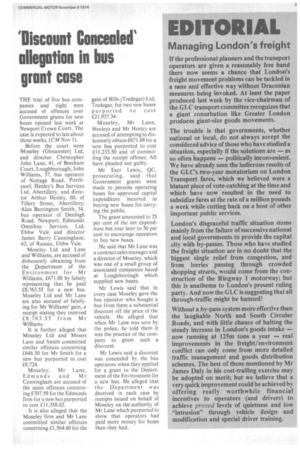EDITORIAL
Page 23

If you've noticed an error in this article please click here to report it so we can fix it.
Managing London's freight
If the professional planners and the transport operators are given a reasonably free hand there now seems a chance that London's freight movement problems can be tackled in a sane and effective way without Draconian measures being invoked. At least the paper produced last week by the vice-chairman of the GLC transport committee recognizes that a giant conurbation like Greater London produces giant-size goods movements.
The trouble is that governments, whether national or local, do not always accept the considered advice of those who have studied a situation, especially if the solutions are -as so often happens — politically inconvenient. We have already seen the ludicrous results of the GLC's two-year moratorium on London Transport fares, which we believed were a blatant piece of vote-catching at the time and which have now resulted in the need to subsidize fares at the rate of a million pounds a week while cutting back on a host of other important public services.
London's disgraceful traffic situation stems mainly from the failure of successive national and local governments to provide the capital city with by-passes. Those who have studied the freight situation are in no doubt that the biggest single relief from congestion, and from lorries passing through crowded shopping streets, would come from the construction of the Ringway 1 motorway; but this is anathema to London's present ruling party. And now the CI C is suggesting that all through-traffic might be banned!
Without a by-pass system more effective than the laughable North and South Circular Roads, and with little chance of halting the steady increase in London's goods intake — now running at 125m tons a year — real improvements in the freight/environment conflict can only come from more detailed traffic management and goods distribution schemes. The best of those mentioned by Mr James Daly in his cost-trailing exercise may be adopted on merit; but we believe that a very quick improvement could be achieved by offering really worthwhile financial incentives to operators (and drivers) to achieve proved levels of quietness and low "intrusion" through vehicle design and modification and special driver training.




































































































































































































